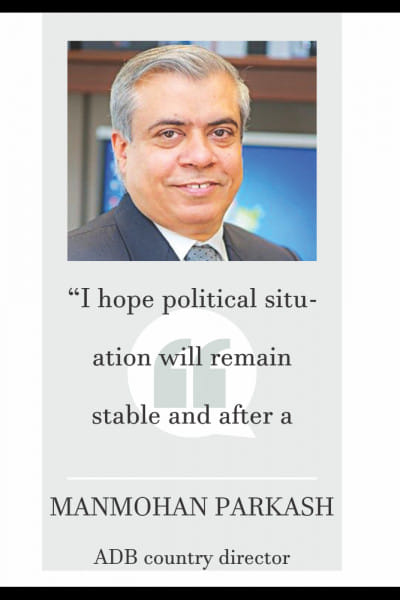Inflationary risks high: ADB

Rising global oil price, local currency depreciation and a hike in energy prices may push inflation up in Bangladesh, said the Asian Development Bank yesterday.
Inflation may hit 6.3 percent in fiscal 2018-19 thanks to higher fuel prices, currency depreciation and upward adjustment of natural gas and electricity prices, said the Manila-based lender in its Asian Development Outlook 2018 report, which was unveiled yesterday at its office in Dhaka.
Government data showed inflation declined and stood at 5.5 percent in the fiscal year that ended on June 30, the report said.
The multilateral lender, however, said Bangladesh will continue to achieve high economic growth driven by booming domestic consumption, government spending, growth in export and inflow of remittance.
Bangladesh has the capacity to grow at 7.5 percent this fiscal year, after achieving its fastest economic growth of 7.86 percent last fiscal year due to a significant boost in farm and industrial sectors.
Growth was led by higher public investment, which increased to 8 percent of GDP from 7.4 percent a year earlier, and a steep rise in private consumption as remittances recovered, said Manmohan Parkash, country director for ADB's Bangladesh resident mission.
He, however, believes the economy can log in 8 percent growth provided there is a bump in private sector investment and exports as well as better policy support.
The possibility of political volatility ahead of the parliamentary election later this year is unlikely to derail the growth momentum.
“I hope the political situation will remain stable and after a few days of the election the situation will be normal. So, there is no possibility of disruption to economic activities due to political activities,” Parkash added.
The ADB expressed concern over the government's huge subsidy bill, which is expected to increase to $3.9 billion, or 1.3 percent of GDP, thanks to higher allocation to the power and agriculture sectors.
Bangladesh's growth outlook has downside risks, notably from the inability to rein in import demand, failure to mobilise appropriate financing to cover the widening current account deficit, an unexpectedly large increase in global oil price or unfavourable weather.
In fiscal 2017-18, import growth surged to 25.2 percent from 9 percent a year earlier on the back of higher demand for capital goods, export-related intermediate goods and food grains to offset large crop losses, said Soon Chan Hong, senior economist at ADB's Dhaka office.
Import payments will rise further this fiscal year on higher global oil prices and real demand, brought on by the leasing of two floating storage and re-gasification units for liquefied natural gas. He further said the pickup in import of capital goods reflected the government's medium-term priority on infrastructure that facilitates rapid economic growth.
The surge in import demand doubled the trade deficit to $18.3 billion in fiscal 2017-18.
Remittance inflow grew robustly by 17.3 percent to reach $15 billion in fiscal 2017-18, after declining in the previous two years.
The rebound was due to an increase in the number of workers going abroad in the last few years, Hong said.
Regarding the trade tension between the US and China, he said the Bangladesh economy stands to benefit as the US endeavours to bring down its import dependency on China.
“But, it will depend on how prolonged the trade war is,” he added.

 For all latest news, follow The Daily Star's Google News channel.
For all latest news, follow The Daily Star's Google News channel. 








Comments